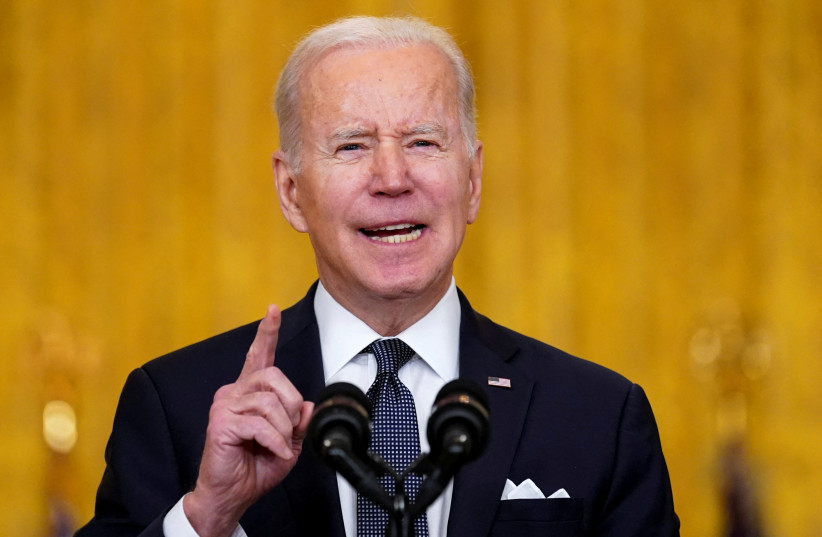Russia invaded neighboring Ukraine on Thursday, pounding the country with artillery fire and sending troops across the border from the east, north and south. US President Joe Biden’s response in an address to the nation was to impose strong economic sanctions on Russia.
He stopped short on Thursday of sanctioning Russian President Vladimir Putin himself or announcing that Russia will be cut off from the Swift global payments network.
Putin was not deterred, the invasion of Ukraine continued, Kyiv was under attack and on Friday, the US, Canada, Britain and the EU added Putin and Foreign Minister Sergei Lavrov to their sanctions list. No decision, however, has yet been made regarding Swift.
The Ukrainians are so desperate for manpower in helping them battle the Russians that they are appealing to citizens around the world – their embassy in Tel Aviv put out an appeal to Israelis – to come and volunteer to fight for Ukrainian freedom, reminiscent of foreign volunteers fighting in the Spanish Civil War.
And the Western response? Hit Russia in the pocketbook.

In so doing, the West is once again showing how it views the world through its own pair of glasses, believing that economic well-being is everything for everyone, and underplaying the power and force of ideology.
There is more than just a little irony in the West clamping down severe sanctions on Russia and Putin, even as it seems just a hair’s breadth away from lifting sanctions on Iran.
With the Russian invasion of Ukraine, it is not clear what will happen to the fate of the Iranian nuclear talks taking place in Vienna.
While some argue that the US will want to reach a deal quickly to get this issue off the agenda so it can focus on Russia and Ukraine, others are arguing that Iran – prodded on by Russia – will now balk at a deal themselves, armed perhaps with Russian promises to help develop their nuclear program and more than willing to help Moscow deprive the Biden administration of a major “geo-political victory.”
The Biden administration’s eagerness to reenter a deal with Iran even though Iran will not abandon its nuclear designs shows that sanctions did not work. The sanctions devastated the Iranian economy, took a huge toll on the nation, but did not bend the Iranians to the will of the West and force them to mothball their nuclear ambitions.
It is not clear why the West believes that what did not work in Iran, will work with Russia.
If Iran has been able to weather years of sanctions and find small cracks in the sanctions regime, then why think that Russia – whose leaders are no less proud than the Iranian ayatollahs – will buckle, especially since Russia will not have to look for small cracks in the sanctions regime, since it will be able to count on China to provide it with a huge side door that will allow it to evade the full crushing effect of sanctions.
Then there is the ideological underpinning of sanctions: the belief that economic pain will force change. This is predicated on the assumption that the main concern of all leaders and their people is a strong economy.
Former president Shimon Peres fell into this trap, believing in the heyday of the Oslo Accords that if Israel would just improve the economic lot of the Palestinians, peace would flow. Peres, and many others, underestimated the power of ideology: that for Hamas and those of its ilk, money wasn’t everything, and that their ideological furor to bury the Jewish state trumped even a desire for economic prosperity.
For many around the world, ideology, religious fervor and national honor trump all else, and they are willing to sacrifice everything for those values.
This is why sanctions did not move Iran, why it didn’t deter Russia after it invaded Crimea in 2014 and why it has little chance of getting Putin to turn his tanks around in Ukraine. Russians might like western consumer goods, but that doesn’t mean they are willing to abandon what they view as their national honor or patriotic ideals to secure them.
Sanctions alone won’t work. Sanctions coupled with a credible threat of force may be a different story.
But the sanctions against Russia for its invasion of Ukraine were not backed by any credible threat of force.
On the contrary, Biden made clear in his speech Thursday that since Ukraine is not a NATO country, he will not commit any troops for its defense. He’ll send military aid, he’ll send humanitarian aid, he’ll beef up US troops in Ukraine’s neighboring NATO countries but that’s where he will draw the line.
“Let me say it again – our forces are not and will not be engaged in the conflict with Russia in Ukraine,” he said. “Our forces are not going to Europe to fight in Ukraine, but to defend our NATO allies and reassure those allies in the East.”
In the meantime, the EU countries, for whom the fall of Ukraine to Russia have the most to fear, are not exactly heeding appeals from Kyiv to man the Ukrainian barricades. And all the while Putin is watching and taking note.
